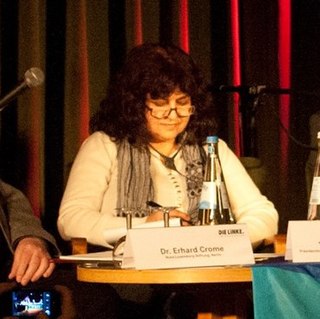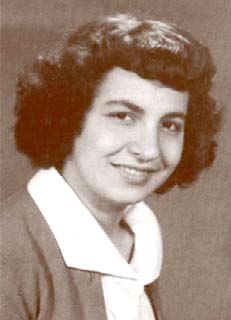Related Research Articles

Simone Lucie Ernestine Marie Bertrand de Beauvoir was a French existentialist philosopher, writer, social theorist, and feminist activist. Though she did not consider herself a philosopher, and even though she was not considered one at the time of her death, she had a significant influence on both feminist existentialism and feminist theory.
Marian Keyes is an Irish author and radio presenter. She is principally known for her popular fiction.

Azadeh Moaveni is an Iranian-American writer, journalist, and academic. She directs the Gender and Conflict Program at the International Crisis Group, and lectures on journalism at New York University’s London campus. She is the author of four books, including the bestselling Lipstick Jihad and Guest House for Young Widows, which was shortlisted for numerous prizes. She contributes to The New York Times, The Guardian, and The London Review of Books.

Elif Shafak is a Turkish-British novelist, essayist, public speaker, political scientist and activist.
The Jamil Hussein controversy was an instance where conservative blogger Michelle Malkin questioned an Associated Press source.
Nazand Begikhani is a contemporary Kurdish/British writer, poet and leading academic researcher into gender based violence, and an active advocate of human rights. She is an honorary Senior Research Fellow at the University of Bristol, Centre for Gender and Violence Research and has been awarded the Vincent Wright Chair 2019/2020 and works as a visiting professor at Sciences Po School for International Affairs, Paris.

Yanar Mohammed is a prominent Iraqi feminist who was born in Baghdad. She is a co-founder and the director of the Organization of Women's Freedom in Iraq, and serves as the editor of the newspaper Al-Mousawat (Equality). She started the first shelters for women in Iraq since 2003, protecting them from "honor killing" and sex-trafficking, a network that expanded to 11 houses in 5 cities in 2018. Her shelters saved hundreds of vulnerable women in 16 years.
Sahar Hussein al-Haideri was an Iraqi female print and radio journalist. She was murdered by extremists on June 7, 2007, becoming at the time the 108th journalist, including the 86th Iraqi journalist, to be killed covering the Iraq War since its outbreak in 2003.
Haifa Zangana is an Iraqi writer, painter, and political activist, known for her novel Women on a Journey: Between Baghdad and London about political repression, violence and exile. She has written both novels and short stories as well as nonfiction, mainly about current political events relating to Iraq, Palestine or Tunisia.
Fouad al-Tikerly was a prominent Iraqi novelist and writer, best known for his groundbreaking novel al-Rajea al-Baeed, translated into English as The Long Way Back. Al-Tikerly was one of the last surviving members of a group of well known Iraqi novelists from the 1970s.

Jamil Sidqi al-Zahawi was a prominent Iraqi poet and philosopher. He is regarded as one of the greatest contemporary poets of the Arab world and was known for his defence of women's rights.

Sinan Antoon, is an Iraqi poet, novelist, scholar, and literary translator. He has been described as "one of the most acclaimed authors of the Arab world." He is an associate professor at the Gallatin School of Individualized Study at New York University.

The Boys from Baghdad High, also known as Baghdad High, is a British-American-French television documentary film. It was first shown in the United Kingdom at the 2007 Sheffield Doc/Fest, before airing on BBC Two on 8 January 2008. It also aired in many other countries including France, Australia, the United States, Canada, Germany and the Netherlands. It documents the lives of four Iraqi schoolboys of different religious or ethnic backgrounds over the course of one year in the form of a video diary. The documentary was filmed by the boys themselves, who were given video cameras for the project.

Inaam Kachachi is an Iraqi journalist and author. Inaam is an Iraqi writer, born in Baghdad in 1952. She studied journalism at Baghdad University, working in Iraqi press and radio before moving to Paris to complete a PhD at the Sorbonne. She is currently the Paris correspondent for London-based newspaper Asharq Al-Awsat and Kol Al-Usra magazine in Sharjah, UAE. Kachachi has published a biography, Lorna, about the British journalist Lorna Hales, who was married to the famous pioneering Iraqi sculptor Jawad Salim, and a book in French about Iraqi women's literature produced in times of war. She produced and directed a documentary about Naziha Al Dulaimi, the first woman to become minister of an Arab country, in 1959. Her first novel Heart Springs appeared in 2005 and her second novel The American Granddaughter, was shortlisted for IPAF in 2009. An English translation of the novel was published by Bloomsbury Qatar Foundation Publishing in 2010.
Days in the Caucasus or Caucasian Days is a memoir by the French writer of Azeri origin Banine, published in Paris in 1945. Ummulbanu Asadullayeva, to give Banine her full name, was the granddaughter of peasants who had become fabulously wealthy through the discovery and sale of oil. In Days in the Caucasus she recalls her upbringing in oil-boom Baku by a Baltic German governess and a devoutly Muslim grandmother who swore like a trooper. It's a tale of East meets West: of pogroms, revolution, end of empire, coming of age, forced marriage and multiple escapes – to Persia, Georgia and eventually Paris.

Safa Abdul-Aziz Khulusi was an Iraqi historian, novelist, poet, journalist and broadcaster. He is known for mediating between Arabic- and English-language cultures, and for his scholarship of modern Iraqi literature.
Hanaa Malallah is an Iraqi artist and educator living in London, England. Her surname also appears in English as Mal-Allah. She is noted for developing the technique called the Ruins Technique in which found objects are incorporated into artwork.

Widad Al-Orfali is an Iraqi artist and musician. In the early 1980s, she founded a private art gallery in Iraq, which she later moved to Jordan after the start of the Iran-Iraq War.
Asmaa Jamil Rashid is an Iraqi professor at the University of Baghdad's Center for Women's Studies. She has a PhD in sociology and specializes in the sociology of gender. Rashid is a representative of the Iraqi Women's League and has given presentations and workshops on the topics of youth reluctance to vote, domestic violence, gender discrimination in school curriculum, female drop out rate in rural areas, limiting child marriage, and the employment of widowed women. Rashid is also a teacher at the Center for the Revival of Arab Scientific Heritage.
May Muzaffar is a Jordan-based Iraqi poet, short story writer, translator, and editor.
References
- ↑ "Comment, opinion and discussion from the Guardian US". The Guardian. Retrieved 28 January 2016.
- ↑ "Betool Khedairi | Penguin Random House". PenguinRandomhouse.com. Retrieved 28 January 2016.
- ↑ Comfort, Susan (18 March 2020). "Resource Wars and Resourceful Resistance: Gender Violence and Irreal Oil Environments in Two Global Novels by Women". MFS Modern Fiction Studies. 66 (1): 20–51. doi: 10.1353/mfs.2020.0001 . ISSN 1080-658X.